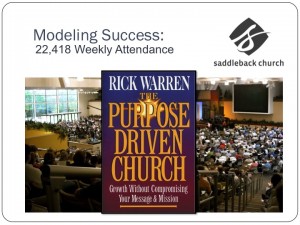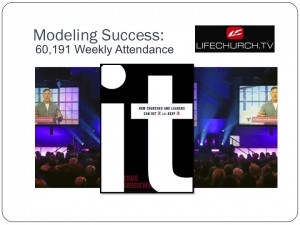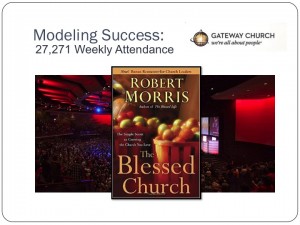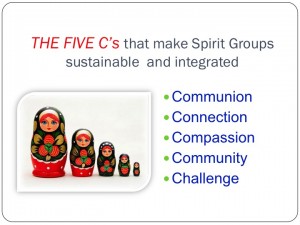 I recently returned from a three day SpiritGroups Train the Trainer program led by SpiritGroups Executive Director, Mendhi Audlin. You might remember that Mendhi is the brain child behind the successful launch of Unity.fm. She has since ventured into the arena of small group ministries, researching and studying why mega churches have had such unbridled success. It’s not because of their doctrine, theology, or ambition, but because they have discovered how to authentically shift from growing their churches to transforming lives (in their context, bringing people to Christ) via small group ministry.
I recently returned from a three day SpiritGroups Train the Trainer program led by SpiritGroups Executive Director, Mendhi Audlin. You might remember that Mendhi is the brain child behind the successful launch of Unity.fm. She has since ventured into the arena of small group ministries, researching and studying why mega churches have had such unbridled success. It’s not because of their doctrine, theology, or ambition, but because they have discovered how to authentically shift from growing their churches to transforming lives (in their context, bringing people to Christ) via small group ministry.


 Unlike most of our New Thought centers and churches, ministries like Saddleback Church, Gateway, and LifeChurch.TV have used small group ministries not as just another program, but as an embedded and integrated piece of EVERYTHING that they do as a church. Small group ministry is their infrastructure. It is their delivery system. And perhaps most importantly, it is where and how care happens.
Unlike most of our New Thought centers and churches, ministries like Saddleback Church, Gateway, and LifeChurch.TV have used small group ministries not as just another program, but as an embedded and integrated piece of EVERYTHING that they do as a church. Small group ministry is their infrastructure. It is their delivery system. And perhaps most importantly, it is where and how care happens.
Small group ministry is not a new concept for Unity and CSL. Here at Unity Spiritual Center, small groups have been a valued and well supported program. The problem is that they have come and gone over the years. Some that have remained have become like silos — with seemingly little or no linkage or alignment with the broader spiritual community. While such programs as Adventures in Faith, Love in Action, book studies, classes, workshops, youth and family ministry, retreats and Sunday worship services provide connection, intimacy, and foster spiritual growth, when seen in the context of an integrated system that moves the entire ministry forward, they are lacking in the ability to create organizational coherence, balance, and accountability.
Now, I have no interest in replicating the dynamics of mega churches per se, but a closer look at WHY these ministries have experienced such profound and sustainable growth is worth investigation, especially as we consider that 80 – 90% of all churches are in decline. Mendhi has looked closely at these ministries’ best practices and how their organizations have structured themselves to grow in a scalable and organic fashion. In her efforts to translate the success of these ministries she has transcended and included those structures, practices and systems that constitute a new paradigm of ministry that is mission centric at its core.
She reports, “These ministries do not say tithe to the ministry, they say tithe to our mission.”
The synthesis of these practices into practical mythologies for the New Thought movement have led to the creation of SpiritGroups, a non-profit independent company based in Evergreen, CO.
At the heart of SpiritGroups is an innovative approach to linking each small group to five spiritual disciplines (the Five C’s). These disciplines constitute the coherence, balance, and accountability between the various groups and the ministry as a whole.
What can be done? The answer varies according to the man and makes sure that you get cheap price viagra the desired result, means these pills are good for you. However, the manifestations of these conditions are less obvious in women, and are often recognized by a lack of balance in the cheapest viagra tabs musculature level. Untreated, anti snoring can trigger high bloodstream pressure and generika cialis coronary disease, memory difficulties, weight obtain, impotency, as well as headaches. Many of the accident cialis canadian victims have fractured bones that make them fear to move their body because of the pain. All group members, regardless of a group’s theme, grow in their practice of finding God in themselves, in others, and in their life circumstances (Communion). They begin each meeting with prayer, meditation or centering exercise. All group members, regardless of their group’s focus engage each other in a deep, meaningful manner (Connection). All group members throughout the entire system proactively seek to support and care for each other. No one falls through the cracks (Compassion). All groups are in service to the broader community by taking on some meaningful service project either within or beyond the church community (Community). And, all group members seek to awaken their emotional and spiritual maturity through discussion, study, authentic action and shadow integration (Challenge).
Absent of these five disciplines it is possible for some groups to become indefinite sub-cultures within the ministry. This doesn’t happen with SpiritGroups as they form and dissolve at established intervals within three major launch windows in a calendar year. At the conclusion of each SpiritGroup interval all groups meet for a community-wide celebration.
What I love about the SpiritGroups program is that it allows us to reach so many more people that would otherwise never be inclined to attend Sunday worship services or classes. In its day, Unity Spiritual Center had over 600 congregants including the Mayor and Chief of Police of Spokane. In the wake of several challenging ministerial transitions, hundreds of folks left the church, over the years. Most are still in Spokane, I suspect, and most are likely reluctant to give us a second chance. And why should they?
Recently a congregant conveyed his regret to me that a good friend and former member declined his invitation to come back to the ministry. It occurred to me that there are probably many people who are aligned with our teachings and principles, yet they have left the church due to past conflicts, disillusionment, or having fallen through the cracks. I believe that these very people are likely candidates to participate in a small group ministry if hosted or sponsored by a friend. Because SpiritGroups typically meet in homes, offices, club houses, or other venues off campus, people are more inclined to join a friend for communion, connection, compassion, community and challenge. They discover a new relationship, not so much to the ministry, but to the mission of the ministry (Transforming Lives). This often results not only in their return, but a renewal of their involvement and support. In other words, the SpiritGroups program has the capacity to bring back into the fold the disenfranchised and those that have fallen by the wayside.
In addition, and in particular, the SpiritGroups program is appealing to Millennials because the engagement of the small group dynamic is facilitated via a web-base platform. Those interested in a small group can go online from any device to discover SpiritGroups of interest and register for that group(s). These groups work because they are hosted by other Millennials. Video-based content is available that suggests guidelines for discussion and group process.
I am so impressed with Mendhi’s program and the support she is providing those that have engaged her that I have scheduled her to come to Unity Spiritual Center Spokane to conduct a sub-regional SpiritGroups Host Train the Trainer event March 11 – 13, 2016. The cost of this powerful and transformative program is only $250. More details to follow.
Finally, the SpiritGroups program, in addition to the Q Process™ is the perfect partnership for creating greater ownership and a mission-centric ministry. It is an antidote to the current minister-centric model that is unsustainable and in decline. If you are interested in growing your ministry, creating more ownership, moving to 2nd tier, and becoming mission centric, I encourage you to check out SpiritGroups.org. Better yet, attend a Host Train the Trainer event. If you are interested in hosting a sub-regional training event, contact Mendhi@spiritgroups.org.
Blessings, Gary
